University Report: Service User Involvement in Palliative and EoLC
VerifiedAdded on 2022/09/01
|18
|4450
|22
Report
AI Summary
This report delves into the critical role of service user involvement within palliative and end-of-life care (EoLC). It begins by defining service user involvement and its historical context, emphasizing its significance in shaping healthcare services and improving patient outcomes. The report then focuses on the specific context of palliative and EoLC, outlining the benefits such as improved patient outcomes, reduced waiting times, and increased patient satisfaction. It also addresses the challenges associated with service user involvement, including issues like lack of public education, inadequate pain management, and disparities in access to services for vulnerable populations. The report offers recommendations for enhancing service user involvement, including the need for policy development, improved training for healthcare professionals, and strategies for addressing inequalities. The report concludes by highlighting the importance of patient autonomy and empowerment in healthcare decision-making, advocating for a more inclusive and patient-centered approach to palliative and EoLC.

Running head: REPORT
Contemporary Issues Report
Name of the Student
Name of the University
Author Note
Contemporary Issues Report
Name of the Student
Name of the University
Author Note
Paraphrase This Document
Need a fresh take? Get an instant paraphrase of this document with our AI Paraphraser
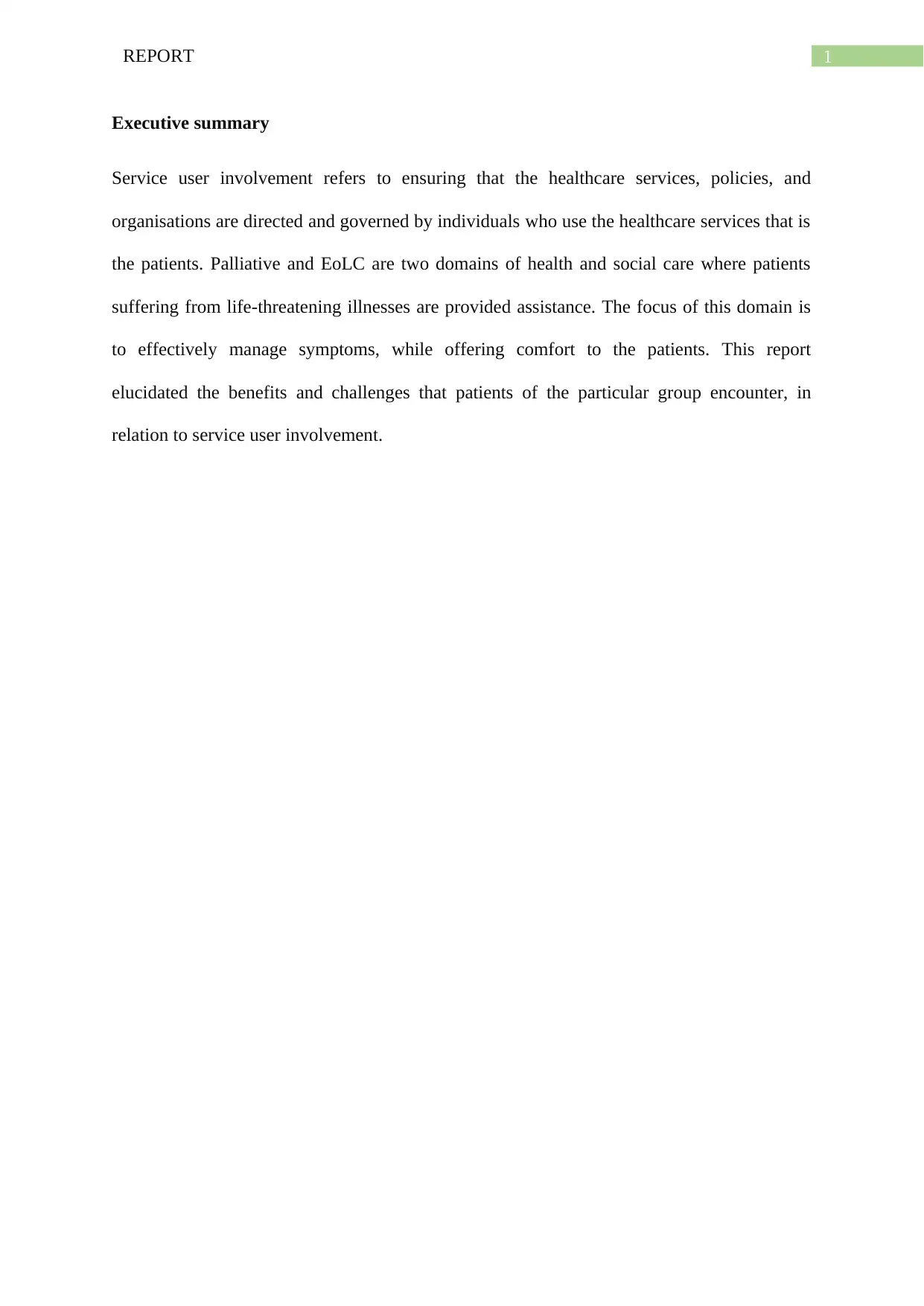
1REPORT
Executive summary
Service user involvement refers to ensuring that the healthcare services, policies, and
organisations are directed and governed by individuals who use the healthcare services that is
the patients. Palliative and EoLC are two domains of health and social care where patients
suffering from life-threatening illnesses are provided assistance. The focus of this domain is
to effectively manage symptoms, while offering comfort to the patients. This report
elucidated the benefits and challenges that patients of the particular group encounter, in
relation to service user involvement.
Executive summary
Service user involvement refers to ensuring that the healthcare services, policies, and
organisations are directed and governed by individuals who use the healthcare services that is
the patients. Palliative and EoLC are two domains of health and social care where patients
suffering from life-threatening illnesses are provided assistance. The focus of this domain is
to effectively manage symptoms, while offering comfort to the patients. This report
elucidated the benefits and challenges that patients of the particular group encounter, in
relation to service user involvement.
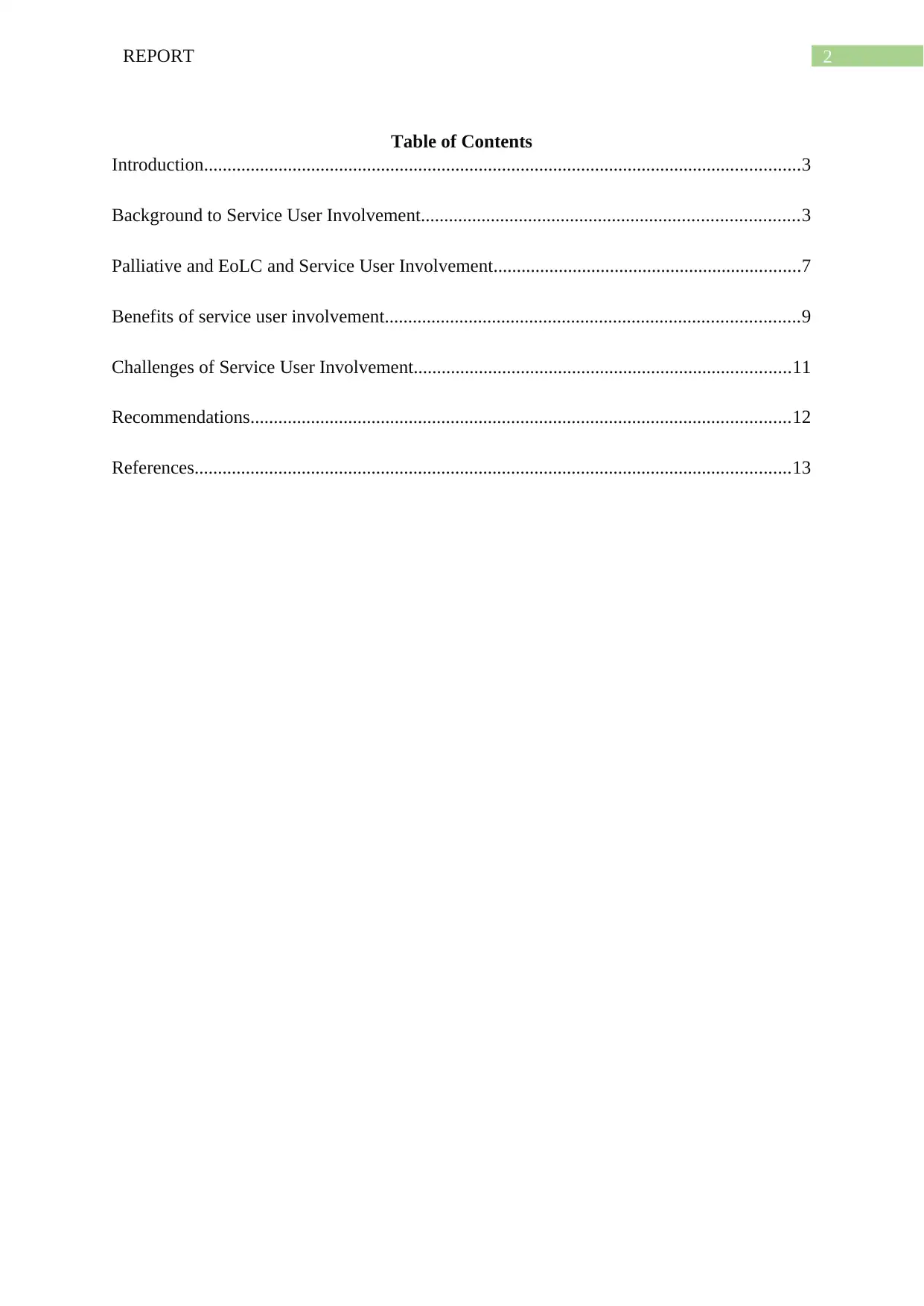
2REPORT
Table of Contents
Introduction................................................................................................................................3
Background to Service User Involvement.................................................................................3
Palliative and EoLC and Service User Involvement..................................................................7
Benefits of service user involvement.........................................................................................9
Challenges of Service User Involvement.................................................................................11
Recommendations....................................................................................................................12
References................................................................................................................................13
Table of Contents
Introduction................................................................................................................................3
Background to Service User Involvement.................................................................................3
Palliative and EoLC and Service User Involvement..................................................................7
Benefits of service user involvement.........................................................................................9
Challenges of Service User Involvement.................................................................................11
Recommendations....................................................................................................................12
References................................................................................................................................13
⊘ This is a preview!⊘
Do you want full access?
Subscribe today to unlock all pages.

Trusted by 1+ million students worldwide
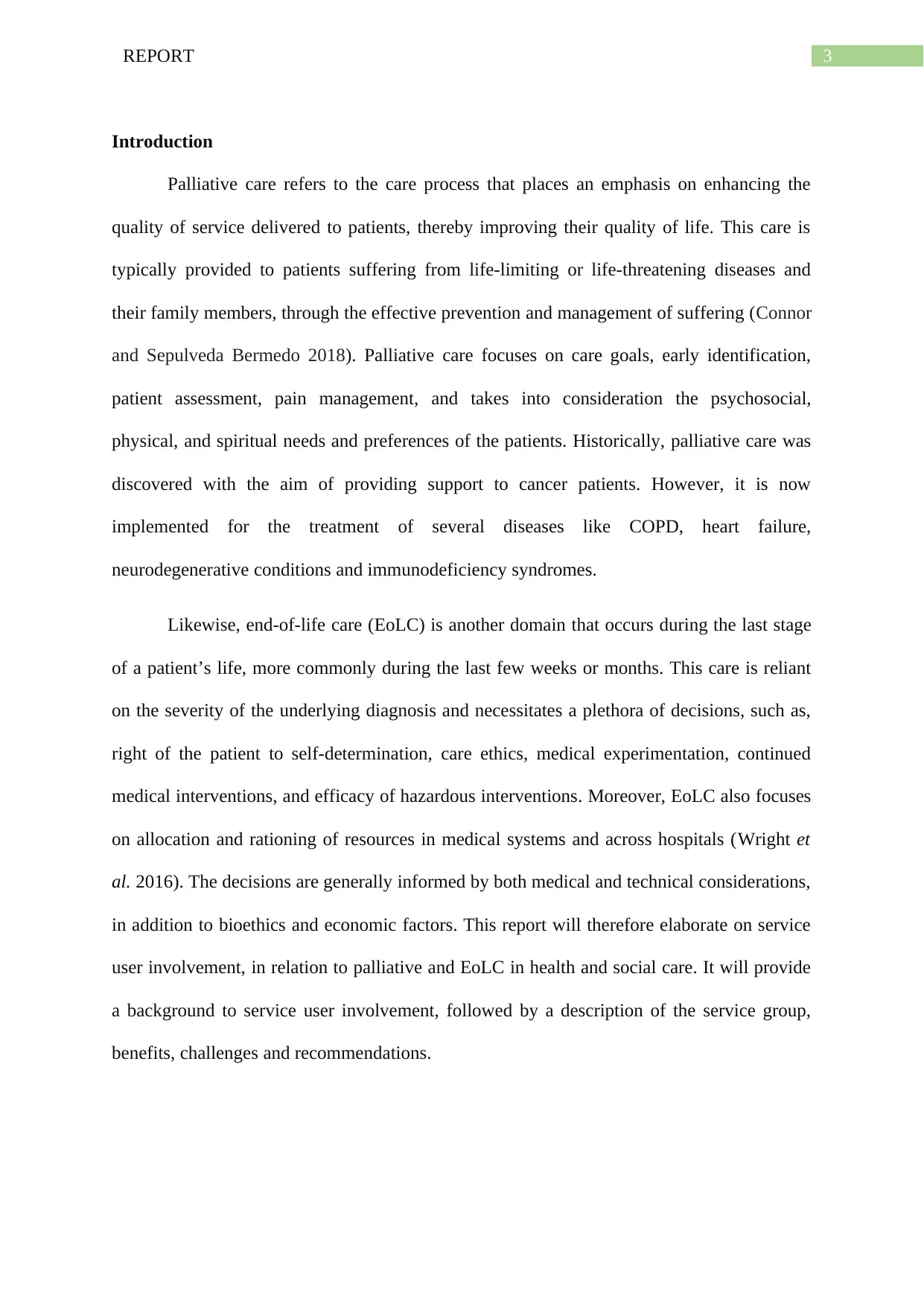
3REPORT
Introduction
Palliative care refers to the care process that places an emphasis on enhancing the
quality of service delivered to patients, thereby improving their quality of life. This care is
typically provided to patients suffering from life-limiting or life-threatening diseases and
their family members, through the effective prevention and management of suffering (Connor
and Sepulveda Bermedo 2018). Palliative care focuses on care goals, early identification,
patient assessment, pain management, and takes into consideration the psychosocial,
physical, and spiritual needs and preferences of the patients. Historically, palliative care was
discovered with the aim of providing support to cancer patients. However, it is now
implemented for the treatment of several diseases like COPD, heart failure,
neurodegenerative conditions and immunodeficiency syndromes.
Likewise, end-of-life care (EoLC) is another domain that occurs during the last stage
of a patient’s life, more commonly during the last few weeks or months. This care is reliant
on the severity of the underlying diagnosis and necessitates a plethora of decisions, such as,
right of the patient to self-determination, care ethics, medical experimentation, continued
medical interventions, and efficacy of hazardous interventions. Moreover, EoLC also focuses
on allocation and rationing of resources in medical systems and across hospitals (Wright et
al. 2016). The decisions are generally informed by both medical and technical considerations,
in addition to bioethics and economic factors. This report will therefore elaborate on service
user involvement, in relation to palliative and EoLC in health and social care. It will provide
a background to service user involvement, followed by a description of the service group,
benefits, challenges and recommendations.
Introduction
Palliative care refers to the care process that places an emphasis on enhancing the
quality of service delivered to patients, thereby improving their quality of life. This care is
typically provided to patients suffering from life-limiting or life-threatening diseases and
their family members, through the effective prevention and management of suffering (Connor
and Sepulveda Bermedo 2018). Palliative care focuses on care goals, early identification,
patient assessment, pain management, and takes into consideration the psychosocial,
physical, and spiritual needs and preferences of the patients. Historically, palliative care was
discovered with the aim of providing support to cancer patients. However, it is now
implemented for the treatment of several diseases like COPD, heart failure,
neurodegenerative conditions and immunodeficiency syndromes.
Likewise, end-of-life care (EoLC) is another domain that occurs during the last stage
of a patient’s life, more commonly during the last few weeks or months. This care is reliant
on the severity of the underlying diagnosis and necessitates a plethora of decisions, such as,
right of the patient to self-determination, care ethics, medical experimentation, continued
medical interventions, and efficacy of hazardous interventions. Moreover, EoLC also focuses
on allocation and rationing of resources in medical systems and across hospitals (Wright et
al. 2016). The decisions are generally informed by both medical and technical considerations,
in addition to bioethics and economic factors. This report will therefore elaborate on service
user involvement, in relation to palliative and EoLC in health and social care. It will provide
a background to service user involvement, followed by a description of the service group,
benefits, challenges and recommendations.
Paraphrase This Document
Need a fresh take? Get an instant paraphrase of this document with our AI Paraphraser
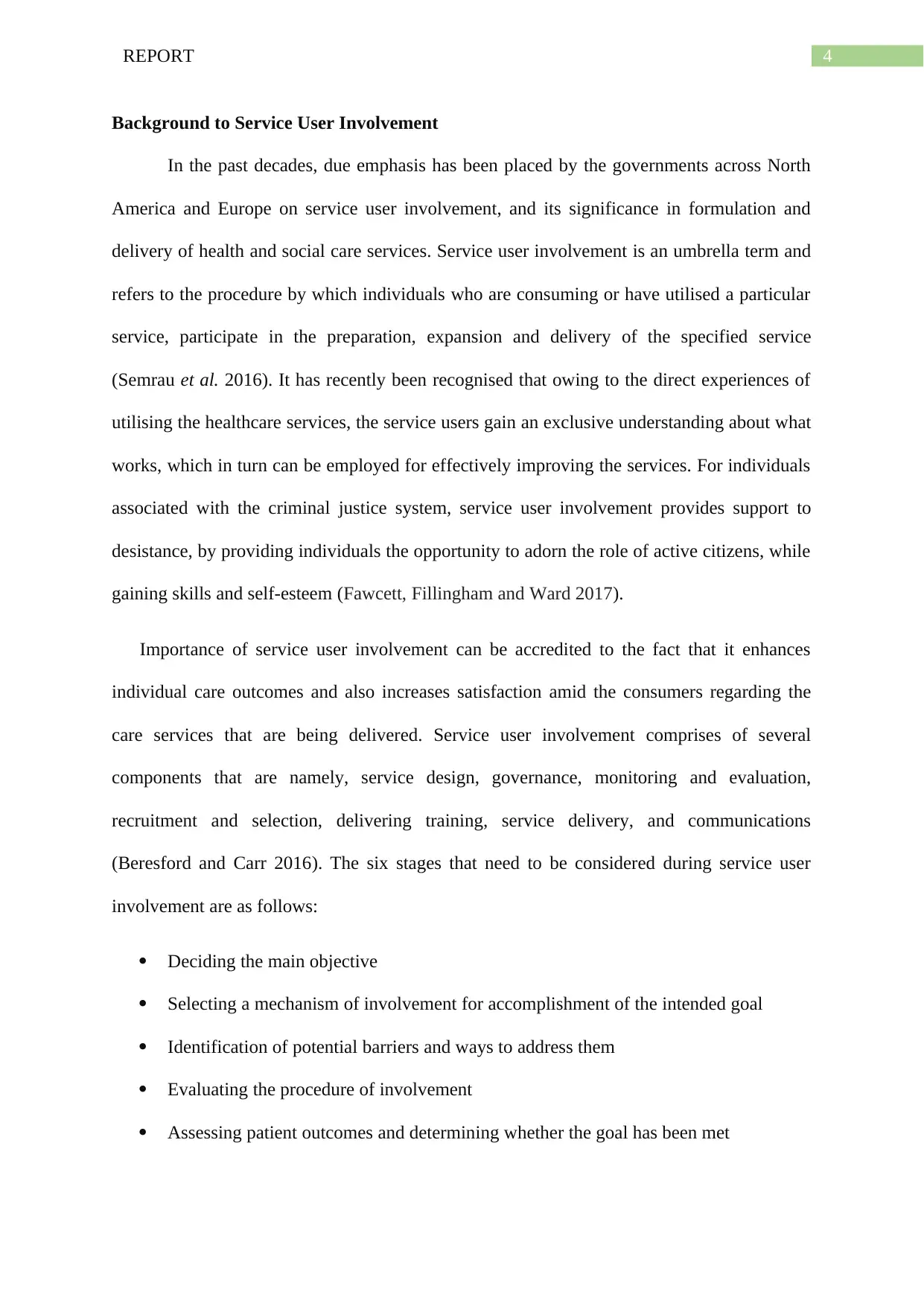
4REPORT
Background to Service User Involvement
In the past decades, due emphasis has been placed by the governments across North
America and Europe on service user involvement, and its significance in formulation and
delivery of health and social care services. Service user involvement is an umbrella term and
refers to the procedure by which individuals who are consuming or have utilised a particular
service, participate in the preparation, expansion and delivery of the specified service
(Semrau et al. 2016). It has recently been recognised that owing to the direct experiences of
utilising the healthcare services, the service users gain an exclusive understanding about what
works, which in turn can be employed for effectively improving the services. For individuals
associated with the criminal justice system, service user involvement provides support to
desistance, by providing individuals the opportunity to adorn the role of active citizens, while
gaining skills and self-esteem (Fawcett, Fillingham and Ward 2017).
Importance of service user involvement can be accredited to the fact that it enhances
individual care outcomes and also increases satisfaction amid the consumers regarding the
care services that are being delivered. Service user involvement comprises of several
components that are namely, service design, governance, monitoring and evaluation,
recruitment and selection, delivering training, service delivery, and communications
(Beresford and Carr 2016). The six stages that need to be considered during service user
involvement are as follows:
Deciding the main objective
Selecting a mechanism of involvement for accomplishment of the intended goal
Identification of potential barriers and ways to address them
Evaluating the procedure of involvement
Assessing patient outcomes and determining whether the goal has been met
Background to Service User Involvement
In the past decades, due emphasis has been placed by the governments across North
America and Europe on service user involvement, and its significance in formulation and
delivery of health and social care services. Service user involvement is an umbrella term and
refers to the procedure by which individuals who are consuming or have utilised a particular
service, participate in the preparation, expansion and delivery of the specified service
(Semrau et al. 2016). It has recently been recognised that owing to the direct experiences of
utilising the healthcare services, the service users gain an exclusive understanding about what
works, which in turn can be employed for effectively improving the services. For individuals
associated with the criminal justice system, service user involvement provides support to
desistance, by providing individuals the opportunity to adorn the role of active citizens, while
gaining skills and self-esteem (Fawcett, Fillingham and Ward 2017).
Importance of service user involvement can be accredited to the fact that it enhances
individual care outcomes and also increases satisfaction amid the consumers regarding the
care services that are being delivered. Service user involvement comprises of several
components that are namely, service design, governance, monitoring and evaluation,
recruitment and selection, delivering training, service delivery, and communications
(Beresford and Carr 2016). The six stages that need to be considered during service user
involvement are as follows:
Deciding the main objective
Selecting a mechanism of involvement for accomplishment of the intended goal
Identification of potential barriers and ways to address them
Evaluating the procedure of involvement
Assessing patient outcomes and determining whether the goal has been met
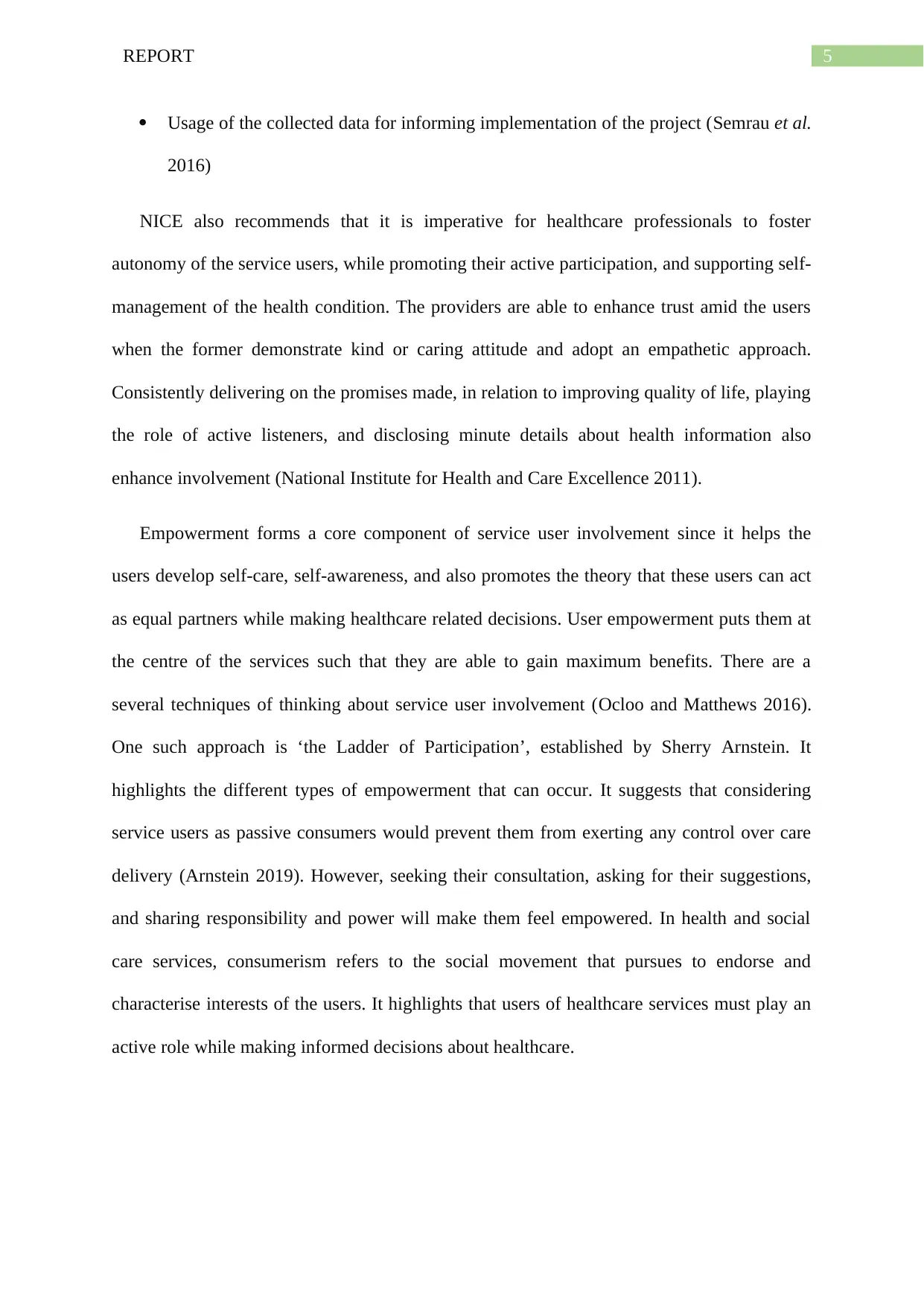
5REPORT
Usage of the collected data for informing implementation of the project (Semrau et al.
2016)
NICE also recommends that it is imperative for healthcare professionals to foster
autonomy of the service users, while promoting their active participation, and supporting self-
management of the health condition. The providers are able to enhance trust amid the users
when the former demonstrate kind or caring attitude and adopt an empathetic approach.
Consistently delivering on the promises made, in relation to improving quality of life, playing
the role of active listeners, and disclosing minute details about health information also
enhance involvement (National Institute for Health and Care Excellence 2011).
Empowerment forms a core component of service user involvement since it helps the
users develop self-care, self-awareness, and also promotes the theory that these users can act
as equal partners while making healthcare related decisions. User empowerment puts them at
the centre of the services such that they are able to gain maximum benefits. There are a
several techniques of thinking about service user involvement (Ocloo and Matthews 2016).
One such approach is ‘the Ladder of Participation’, established by Sherry Arnstein. It
highlights the different types of empowerment that can occur. It suggests that considering
service users as passive consumers would prevent them from exerting any control over care
delivery (Arnstein 2019). However, seeking their consultation, asking for their suggestions,
and sharing responsibility and power will make them feel empowered. In health and social
care services, consumerism refers to the social movement that pursues to endorse and
characterise interests of the users. It highlights that users of healthcare services must play an
active role while making informed decisions about healthcare.
Usage of the collected data for informing implementation of the project (Semrau et al.
2016)
NICE also recommends that it is imperative for healthcare professionals to foster
autonomy of the service users, while promoting their active participation, and supporting self-
management of the health condition. The providers are able to enhance trust amid the users
when the former demonstrate kind or caring attitude and adopt an empathetic approach.
Consistently delivering on the promises made, in relation to improving quality of life, playing
the role of active listeners, and disclosing minute details about health information also
enhance involvement (National Institute for Health and Care Excellence 2011).
Empowerment forms a core component of service user involvement since it helps the
users develop self-care, self-awareness, and also promotes the theory that these users can act
as equal partners while making healthcare related decisions. User empowerment puts them at
the centre of the services such that they are able to gain maximum benefits. There are a
several techniques of thinking about service user involvement (Ocloo and Matthews 2016).
One such approach is ‘the Ladder of Participation’, established by Sherry Arnstein. It
highlights the different types of empowerment that can occur. It suggests that considering
service users as passive consumers would prevent them from exerting any control over care
delivery (Arnstein 2019). However, seeking their consultation, asking for their suggestions,
and sharing responsibility and power will make them feel empowered. In health and social
care services, consumerism refers to the social movement that pursues to endorse and
characterise interests of the users. It highlights that users of healthcare services must play an
active role while making informed decisions about healthcare.
⊘ This is a preview!⊘
Do you want full access?
Subscribe today to unlock all pages.

Trusted by 1+ million students worldwide
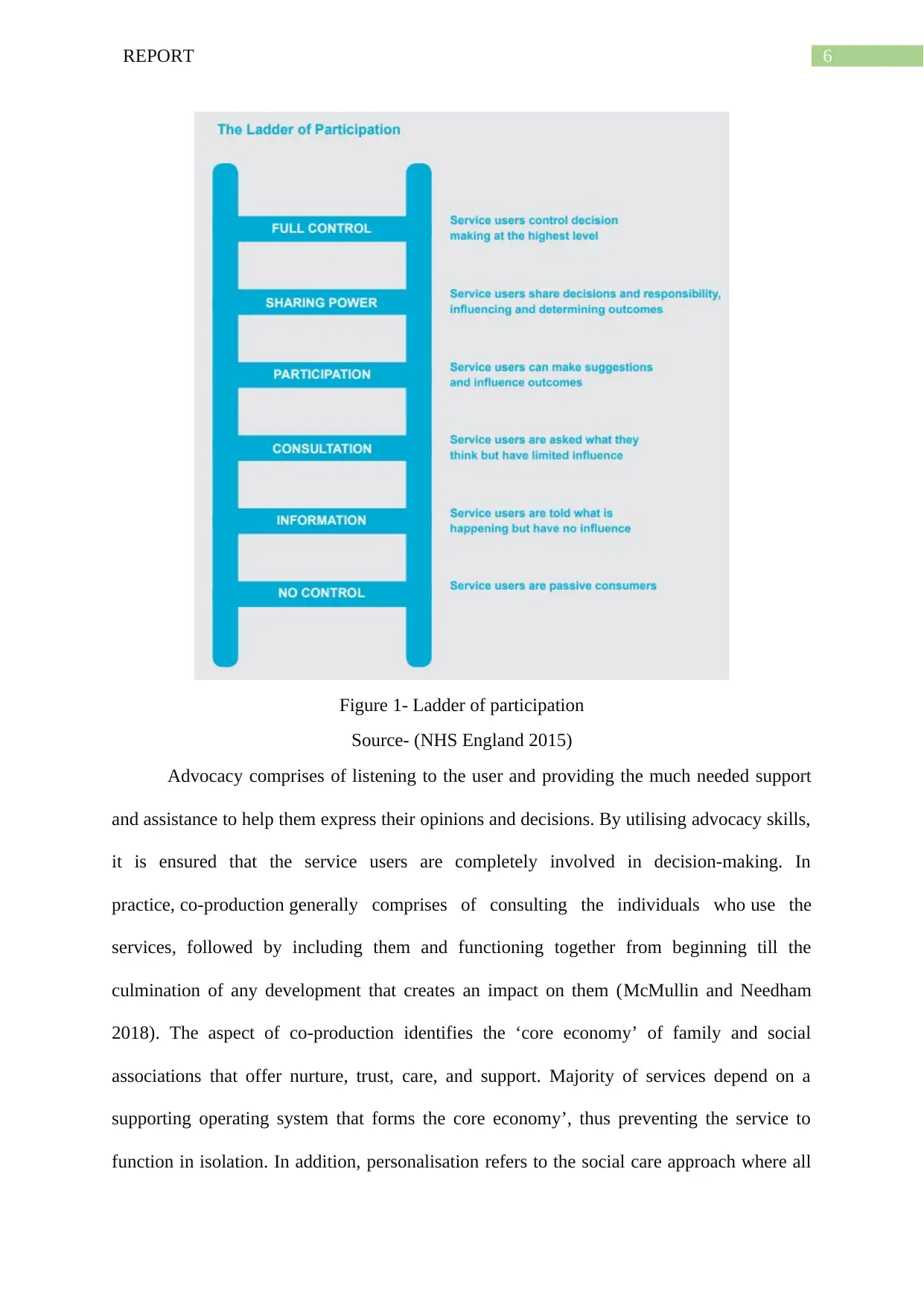
6REPORT
Figure 1- Ladder of participation
Source- (NHS England 2015)
Advocacy comprises of listening to the user and providing the much needed support
and assistance to help them express their opinions and decisions. By utilising advocacy skills,
it is ensured that the service users are completely involved in decision-making. In
practice, co-production generally comprises of consulting the individuals who use the
services, followed by including them and functioning together from beginning till the
culmination of any development that creates an impact on them (McMullin and Needham
2018). The aspect of co-production identifies the ‘core economy’ of family and social
associations that offer nurture, trust, care, and support. Majority of services depend on a
supporting operating system that forms the core economy’, thus preventing the service to
function in isolation. In addition, personalisation refers to the social care approach where all
Figure 1- Ladder of participation
Source- (NHS England 2015)
Advocacy comprises of listening to the user and providing the much needed support
and assistance to help them express their opinions and decisions. By utilising advocacy skills,
it is ensured that the service users are completely involved in decision-making. In
practice, co-production generally comprises of consulting the individuals who use the
services, followed by including them and functioning together from beginning till the
culmination of any development that creates an impact on them (McMullin and Needham
2018). The aspect of co-production identifies the ‘core economy’ of family and social
associations that offer nurture, trust, care, and support. Majority of services depend on a
supporting operating system that forms the core economy’, thus preventing the service to
function in isolation. In addition, personalisation refers to the social care approach where all
Paraphrase This Document
Need a fresh take? Get an instant paraphrase of this document with our AI Paraphraser
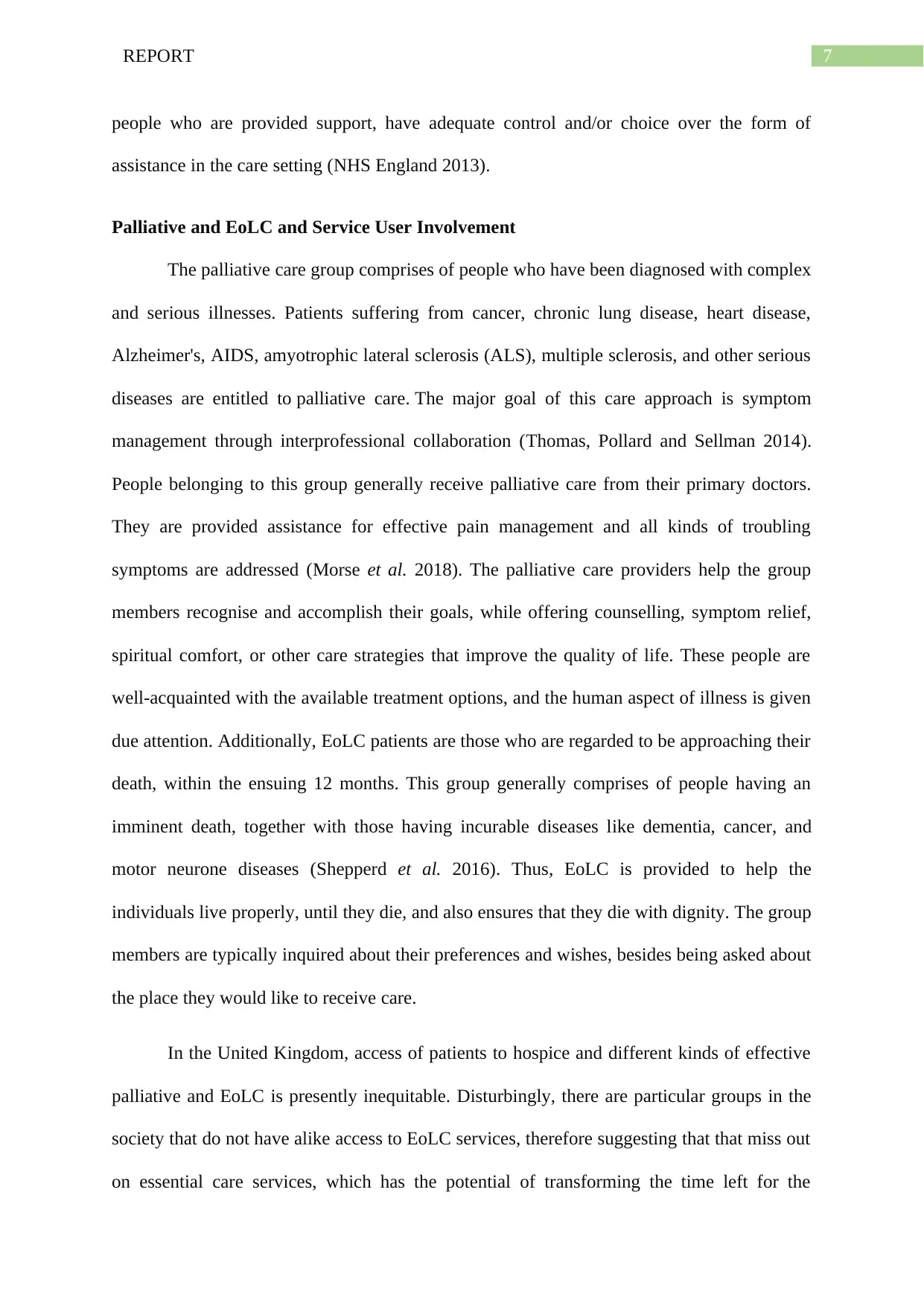
7REPORT
people who are provided support, have adequate control and/or choice over the form of
assistance in the care setting (NHS England 2013).
Palliative and EoLC and Service User Involvement
The palliative care group comprises of people who have been diagnosed with complex
and serious illnesses. Patients suffering from cancer, chronic lung disease, heart disease,
Alzheimer's, AIDS, amyotrophic lateral sclerosis (ALS), multiple sclerosis, and other serious
diseases are entitled to palliative care. The major goal of this care approach is symptom
management through interprofessional collaboration (Thomas, Pollard and Sellman 2014).
People belonging to this group generally receive palliative care from their primary doctors.
They are provided assistance for effective pain management and all kinds of troubling
symptoms are addressed (Morse et al. 2018). The palliative care providers help the group
members recognise and accomplish their goals, while offering counselling, symptom relief,
spiritual comfort, or other care strategies that improve the quality of life. These people are
well-acquainted with the available treatment options, and the human aspect of illness is given
due attention. Additionally, EoLC patients are those who are regarded to be approaching their
death, within the ensuing 12 months. This group generally comprises of people having an
imminent death, together with those having incurable diseases like dementia, cancer, and
motor neurone diseases (Shepperd et al. 2016). Thus, EoLC is provided to help the
individuals live properly, until they die, and also ensures that they die with dignity. The group
members are typically inquired about their preferences and wishes, besides being asked about
the place they would like to receive care.
In the United Kingdom, access of patients to hospice and different kinds of effective
palliative and EoLC is presently inequitable. Disturbingly, there are particular groups in the
society that do not have alike access to EoLC services, therefore suggesting that that miss out
on essential care services, which has the potential of transforming the time left for the
people who are provided support, have adequate control and/or choice over the form of
assistance in the care setting (NHS England 2013).
Palliative and EoLC and Service User Involvement
The palliative care group comprises of people who have been diagnosed with complex
and serious illnesses. Patients suffering from cancer, chronic lung disease, heart disease,
Alzheimer's, AIDS, amyotrophic lateral sclerosis (ALS), multiple sclerosis, and other serious
diseases are entitled to palliative care. The major goal of this care approach is symptom
management through interprofessional collaboration (Thomas, Pollard and Sellman 2014).
People belonging to this group generally receive palliative care from their primary doctors.
They are provided assistance for effective pain management and all kinds of troubling
symptoms are addressed (Morse et al. 2018). The palliative care providers help the group
members recognise and accomplish their goals, while offering counselling, symptom relief,
spiritual comfort, or other care strategies that improve the quality of life. These people are
well-acquainted with the available treatment options, and the human aspect of illness is given
due attention. Additionally, EoLC patients are those who are regarded to be approaching their
death, within the ensuing 12 months. This group generally comprises of people having an
imminent death, together with those having incurable diseases like dementia, cancer, and
motor neurone diseases (Shepperd et al. 2016). Thus, EoLC is provided to help the
individuals live properly, until they die, and also ensures that they die with dignity. The group
members are typically inquired about their preferences and wishes, besides being asked about
the place they would like to receive care.
In the United Kingdom, access of patients to hospice and different kinds of effective
palliative and EoLC is presently inequitable. Disturbingly, there are particular groups in the
society that do not have alike access to EoLC services, therefore suggesting that that miss out
on essential care services, which has the potential of transforming the time left for the
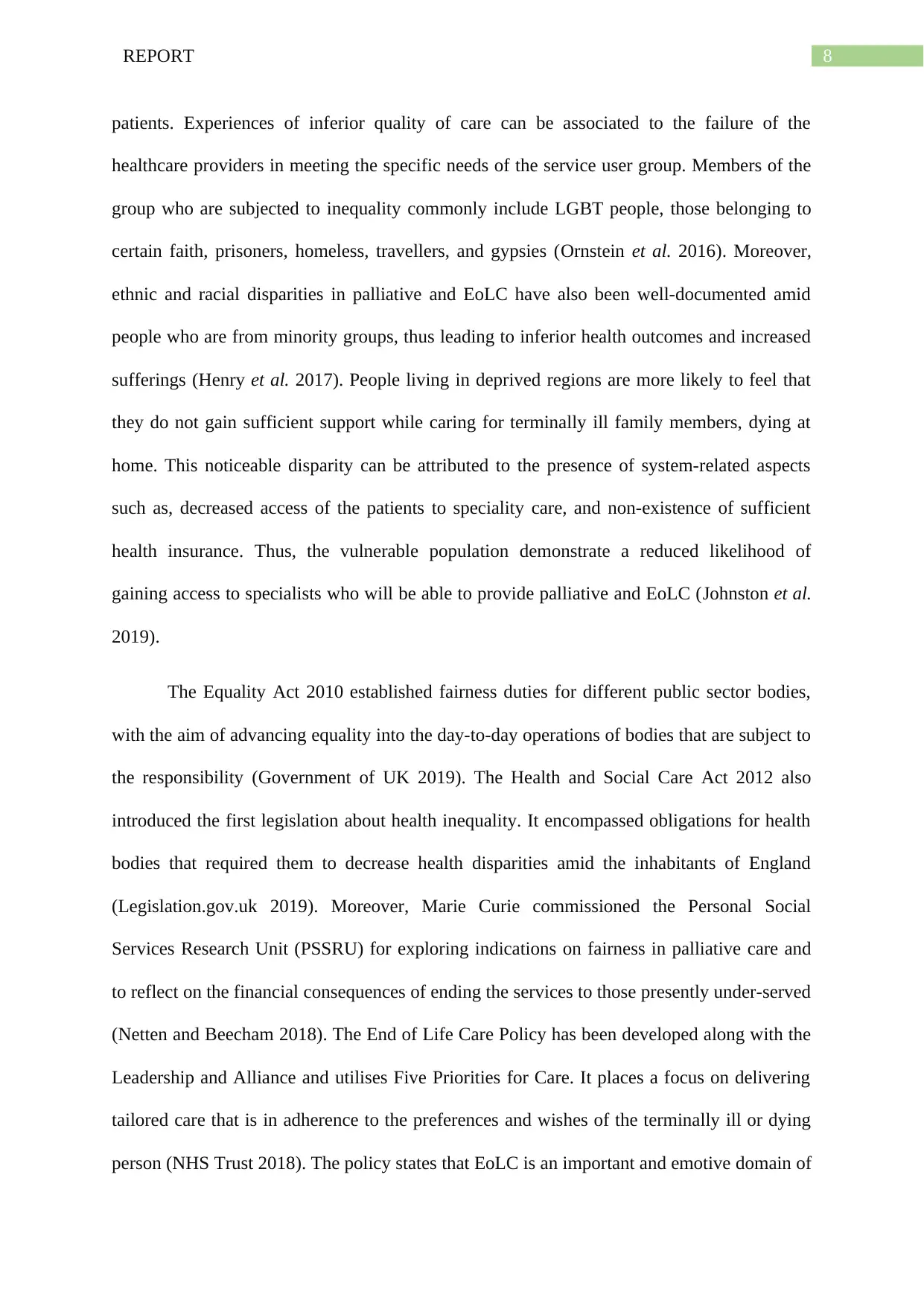
8REPORT
patients. Experiences of inferior quality of care can be associated to the failure of the
healthcare providers in meeting the specific needs of the service user group. Members of the
group who are subjected to inequality commonly include LGBT people, those belonging to
certain faith, prisoners, homeless, travellers, and gypsies (Ornstein et al. 2016). Moreover,
ethnic and racial disparities in palliative and EoLC have also been well-documented amid
people who are from minority groups, thus leading to inferior health outcomes and increased
sufferings (Henry et al. 2017). People living in deprived regions are more likely to feel that
they do not gain sufficient support while caring for terminally ill family members, dying at
home. This noticeable disparity can be attributed to the presence of system-related aspects
such as, decreased access of the patients to speciality care, and non-existence of sufficient
health insurance. Thus, the vulnerable population demonstrate a reduced likelihood of
gaining access to specialists who will be able to provide palliative and EoLC (Johnston et al.
2019).
The Equality Act 2010 established fairness duties for different public sector bodies,
with the aim of advancing equality into the day-to-day operations of bodies that are subject to
the responsibility (Government of UK 2019). The Health and Social Care Act 2012 also
introduced the first legislation about health inequality. It encompassed obligations for health
bodies that required them to decrease health disparities amid the inhabitants of England
(Legislation.gov.uk 2019). Moreover, Marie Curie commissioned the Personal Social
Services Research Unit (PSSRU) for exploring indications on fairness in palliative care and
to reflect on the financial consequences of ending the services to those presently under-served
(Netten and Beecham 2018). The End of Life Care Policy has been developed along with the
Leadership and Alliance and utilises Five Priorities for Care. It places a focus on delivering
tailored care that is in adherence to the preferences and wishes of the terminally ill or dying
person (NHS Trust 2018). The policy states that EoLC is an important and emotive domain of
patients. Experiences of inferior quality of care can be associated to the failure of the
healthcare providers in meeting the specific needs of the service user group. Members of the
group who are subjected to inequality commonly include LGBT people, those belonging to
certain faith, prisoners, homeless, travellers, and gypsies (Ornstein et al. 2016). Moreover,
ethnic and racial disparities in palliative and EoLC have also been well-documented amid
people who are from minority groups, thus leading to inferior health outcomes and increased
sufferings (Henry et al. 2017). People living in deprived regions are more likely to feel that
they do not gain sufficient support while caring for terminally ill family members, dying at
home. This noticeable disparity can be attributed to the presence of system-related aspects
such as, decreased access of the patients to speciality care, and non-existence of sufficient
health insurance. Thus, the vulnerable population demonstrate a reduced likelihood of
gaining access to specialists who will be able to provide palliative and EoLC (Johnston et al.
2019).
The Equality Act 2010 established fairness duties for different public sector bodies,
with the aim of advancing equality into the day-to-day operations of bodies that are subject to
the responsibility (Government of UK 2019). The Health and Social Care Act 2012 also
introduced the first legislation about health inequality. It encompassed obligations for health
bodies that required them to decrease health disparities amid the inhabitants of England
(Legislation.gov.uk 2019). Moreover, Marie Curie commissioned the Personal Social
Services Research Unit (PSSRU) for exploring indications on fairness in palliative care and
to reflect on the financial consequences of ending the services to those presently under-served
(Netten and Beecham 2018). The End of Life Care Policy has been developed along with the
Leadership and Alliance and utilises Five Priorities for Care. It places a focus on delivering
tailored care that is in adherence to the preferences and wishes of the terminally ill or dying
person (NHS Trust 2018). The policy states that EoLC is an important and emotive domain of
⊘ This is a preview!⊘
Do you want full access?
Subscribe today to unlock all pages.

Trusted by 1+ million students worldwide
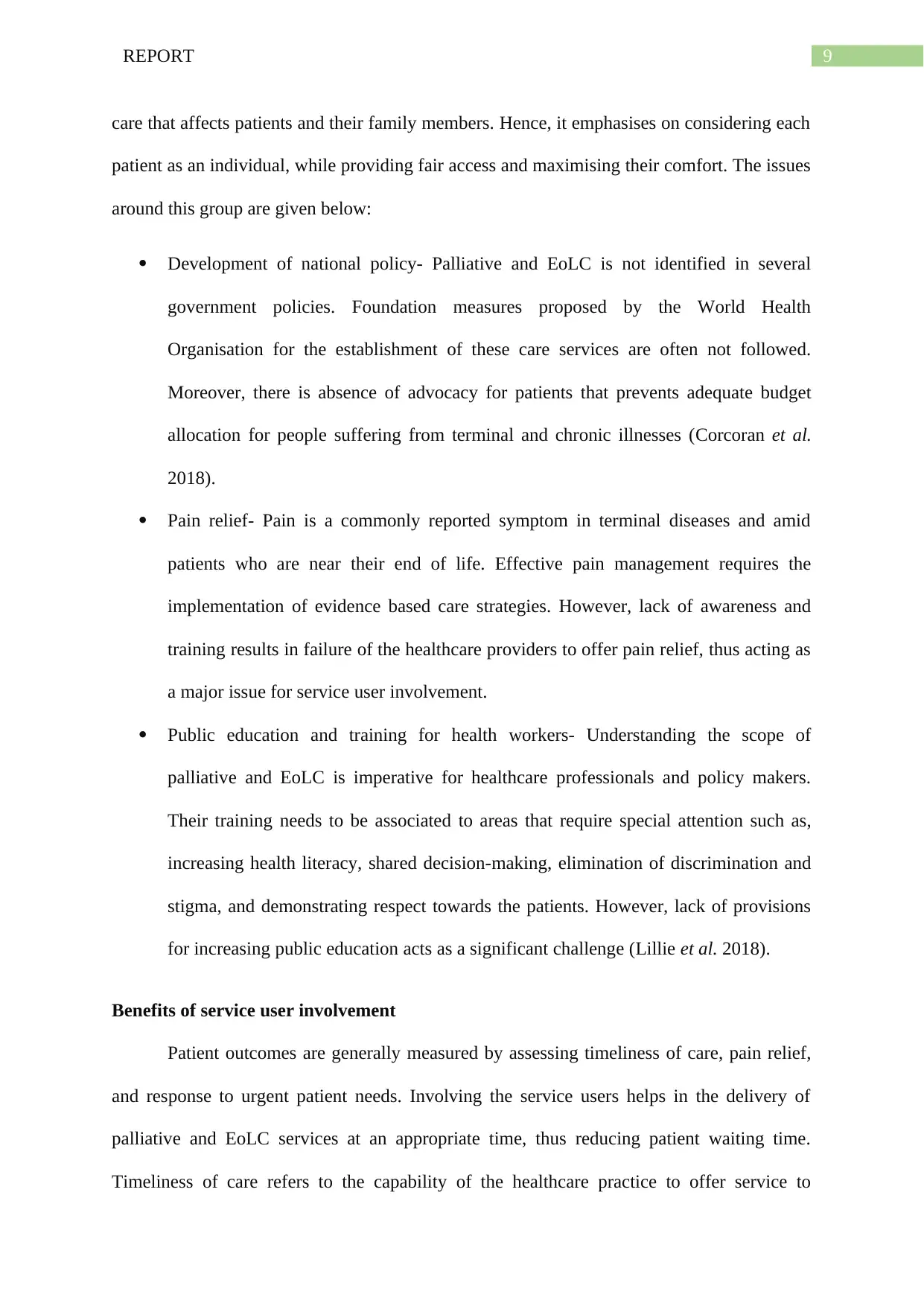
9REPORT
care that affects patients and their family members. Hence, it emphasises on considering each
patient as an individual, while providing fair access and maximising their comfort. The issues
around this group are given below:
Development of national policy- Palliative and EoLC is not identified in several
government policies. Foundation measures proposed by the World Health
Organisation for the establishment of these care services are often not followed.
Moreover, there is absence of advocacy for patients that prevents adequate budget
allocation for people suffering from terminal and chronic illnesses (Corcoran et al.
2018).
Pain relief- Pain is a commonly reported symptom in terminal diseases and amid
patients who are near their end of life. Effective pain management requires the
implementation of evidence based care strategies. However, lack of awareness and
training results in failure of the healthcare providers to offer pain relief, thus acting as
a major issue for service user involvement.
Public education and training for health workers- Understanding the scope of
palliative and EoLC is imperative for healthcare professionals and policy makers.
Their training needs to be associated to areas that require special attention such as,
increasing health literacy, shared decision-making, elimination of discrimination and
stigma, and demonstrating respect towards the patients. However, lack of provisions
for increasing public education acts as a significant challenge (Lillie et al. 2018).
Benefits of service user involvement
Patient outcomes are generally measured by assessing timeliness of care, pain relief,
and response to urgent patient needs. Involving the service users helps in the delivery of
palliative and EoLC services at an appropriate time, thus reducing patient waiting time.
Timeliness of care refers to the capability of the healthcare practice to offer service to
care that affects patients and their family members. Hence, it emphasises on considering each
patient as an individual, while providing fair access and maximising their comfort. The issues
around this group are given below:
Development of national policy- Palliative and EoLC is not identified in several
government policies. Foundation measures proposed by the World Health
Organisation for the establishment of these care services are often not followed.
Moreover, there is absence of advocacy for patients that prevents adequate budget
allocation for people suffering from terminal and chronic illnesses (Corcoran et al.
2018).
Pain relief- Pain is a commonly reported symptom in terminal diseases and amid
patients who are near their end of life. Effective pain management requires the
implementation of evidence based care strategies. However, lack of awareness and
training results in failure of the healthcare providers to offer pain relief, thus acting as
a major issue for service user involvement.
Public education and training for health workers- Understanding the scope of
palliative and EoLC is imperative for healthcare professionals and policy makers.
Their training needs to be associated to areas that require special attention such as,
increasing health literacy, shared decision-making, elimination of discrimination and
stigma, and demonstrating respect towards the patients. However, lack of provisions
for increasing public education acts as a significant challenge (Lillie et al. 2018).
Benefits of service user involvement
Patient outcomes are generally measured by assessing timeliness of care, pain relief,
and response to urgent patient needs. Involving the service users helps in the delivery of
palliative and EoLC services at an appropriate time, thus reducing patient waiting time.
Timeliness of care refers to the capability of the healthcare practice to offer service to
Paraphrase This Document
Need a fresh take? Get an instant paraphrase of this document with our AI Paraphraser
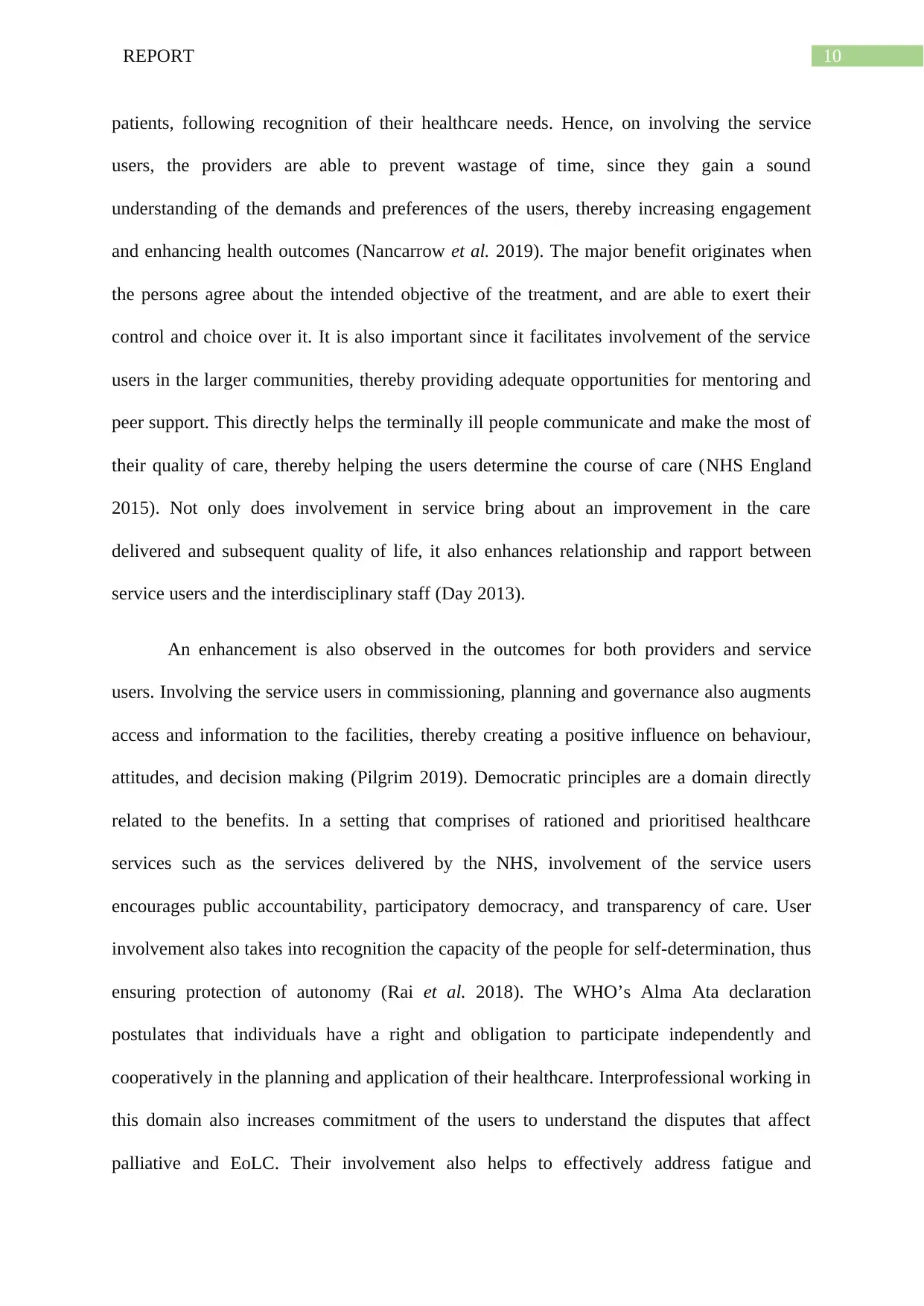
10REPORT
patients, following recognition of their healthcare needs. Hence, on involving the service
users, the providers are able to prevent wastage of time, since they gain a sound
understanding of the demands and preferences of the users, thereby increasing engagement
and enhancing health outcomes (Nancarrow et al. 2019). The major benefit originates when
the persons agree about the intended objective of the treatment, and are able to exert their
control and choice over it. It is also important since it facilitates involvement of the service
users in the larger communities, thereby providing adequate opportunities for mentoring and
peer support. This directly helps the terminally ill people communicate and make the most of
their quality of care, thereby helping the users determine the course of care (NHS England
2015). Not only does involvement in service bring about an improvement in the care
delivered and subsequent quality of life, it also enhances relationship and rapport between
service users and the interdisciplinary staff (Day 2013).
An enhancement is also observed in the outcomes for both providers and service
users. Involving the service users in commissioning, planning and governance also augments
access and information to the facilities, thereby creating a positive influence on behaviour,
attitudes, and decision making (Pilgrim 2019). Democratic principles are a domain directly
related to the benefits. In a setting that comprises of rationed and prioritised healthcare
services such as the services delivered by the NHS, involvement of the service users
encourages public accountability, participatory democracy, and transparency of care. User
involvement also takes into recognition the capacity of the people for self-determination, thus
ensuring protection of autonomy (Rai et al. 2018). The WHO’s Alma Ata declaration
postulates that individuals have a right and obligation to participate independently and
cooperatively in the planning and application of their healthcare. Interprofessional working in
this domain also increases commitment of the users to understand the disputes that affect
palliative and EoLC. Their involvement also helps to effectively address fatigue and
patients, following recognition of their healthcare needs. Hence, on involving the service
users, the providers are able to prevent wastage of time, since they gain a sound
understanding of the demands and preferences of the users, thereby increasing engagement
and enhancing health outcomes (Nancarrow et al. 2019). The major benefit originates when
the persons agree about the intended objective of the treatment, and are able to exert their
control and choice over it. It is also important since it facilitates involvement of the service
users in the larger communities, thereby providing adequate opportunities for mentoring and
peer support. This directly helps the terminally ill people communicate and make the most of
their quality of care, thereby helping the users determine the course of care (NHS England
2015). Not only does involvement in service bring about an improvement in the care
delivered and subsequent quality of life, it also enhances relationship and rapport between
service users and the interdisciplinary staff (Day 2013).
An enhancement is also observed in the outcomes for both providers and service
users. Involving the service users in commissioning, planning and governance also augments
access and information to the facilities, thereby creating a positive influence on behaviour,
attitudes, and decision making (Pilgrim 2019). Democratic principles are a domain directly
related to the benefits. In a setting that comprises of rationed and prioritised healthcare
services such as the services delivered by the NHS, involvement of the service users
encourages public accountability, participatory democracy, and transparency of care. User
involvement also takes into recognition the capacity of the people for self-determination, thus
ensuring protection of autonomy (Rai et al. 2018). The WHO’s Alma Ata declaration
postulates that individuals have a right and obligation to participate independently and
cooperatively in the planning and application of their healthcare. Interprofessional working in
this domain also increases commitment of the users to understand the disputes that affect
palliative and EoLC. Their involvement also helps to effectively address fatigue and
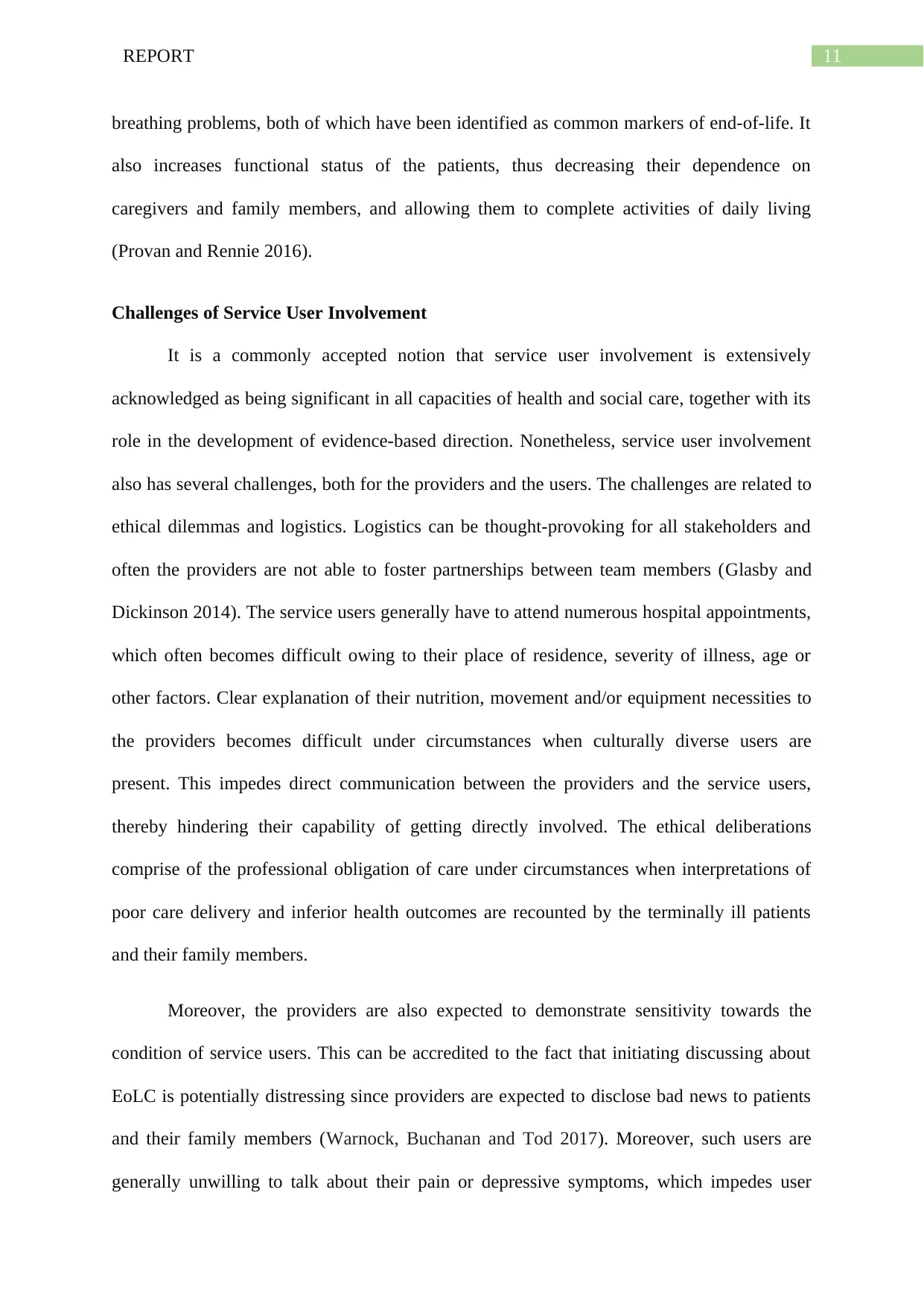
11REPORT
breathing problems, both of which have been identified as common markers of end-of-life. It
also increases functional status of the patients, thus decreasing their dependence on
caregivers and family members, and allowing them to complete activities of daily living
(Provan and Rennie 2016).
Challenges of Service User Involvement
It is a commonly accepted notion that service user involvement is extensively
acknowledged as being significant in all capacities of health and social care, together with its
role in the development of evidence-based direction. Nonetheless, service user involvement
also has several challenges, both for the providers and the users. The challenges are related to
ethical dilemmas and logistics. Logistics can be thought-provoking for all stakeholders and
often the providers are not able to foster partnerships between team members (Glasby and
Dickinson 2014). The service users generally have to attend numerous hospital appointments,
which often becomes difficult owing to their place of residence, severity of illness, age or
other factors. Clear explanation of their nutrition, movement and/or equipment necessities to
the providers becomes difficult under circumstances when culturally diverse users are
present. This impedes direct communication between the providers and the service users,
thereby hindering their capability of getting directly involved. The ethical deliberations
comprise of the professional obligation of care under circumstances when interpretations of
poor care delivery and inferior health outcomes are recounted by the terminally ill patients
and their family members.
Moreover, the providers are also expected to demonstrate sensitivity towards the
condition of service users. This can be accredited to the fact that initiating discussing about
EoLC is potentially distressing since providers are expected to disclose bad news to patients
and their family members (Warnock, Buchanan and Tod 2017). Moreover, such users are
generally unwilling to talk about their pain or depressive symptoms, which impedes user
breathing problems, both of which have been identified as common markers of end-of-life. It
also increases functional status of the patients, thus decreasing their dependence on
caregivers and family members, and allowing them to complete activities of daily living
(Provan and Rennie 2016).
Challenges of Service User Involvement
It is a commonly accepted notion that service user involvement is extensively
acknowledged as being significant in all capacities of health and social care, together with its
role in the development of evidence-based direction. Nonetheless, service user involvement
also has several challenges, both for the providers and the users. The challenges are related to
ethical dilemmas and logistics. Logistics can be thought-provoking for all stakeholders and
often the providers are not able to foster partnerships between team members (Glasby and
Dickinson 2014). The service users generally have to attend numerous hospital appointments,
which often becomes difficult owing to their place of residence, severity of illness, age or
other factors. Clear explanation of their nutrition, movement and/or equipment necessities to
the providers becomes difficult under circumstances when culturally diverse users are
present. This impedes direct communication between the providers and the service users,
thereby hindering their capability of getting directly involved. The ethical deliberations
comprise of the professional obligation of care under circumstances when interpretations of
poor care delivery and inferior health outcomes are recounted by the terminally ill patients
and their family members.
Moreover, the providers are also expected to demonstrate sensitivity towards the
condition of service users. This can be accredited to the fact that initiating discussing about
EoLC is potentially distressing since providers are expected to disclose bad news to patients
and their family members (Warnock, Buchanan and Tod 2017). Moreover, such users are
generally unwilling to talk about their pain or depressive symptoms, which impedes user
⊘ This is a preview!⊘
Do you want full access?
Subscribe today to unlock all pages.

Trusted by 1+ million students worldwide
1 out of 18
Related Documents
Your All-in-One AI-Powered Toolkit for Academic Success.
+13062052269
info@desklib.com
Available 24*7 on WhatsApp / Email
![[object Object]](/_next/static/media/star-bottom.7253800d.svg)
Unlock your academic potential
Copyright © 2020–2026 A2Z Services. All Rights Reserved. Developed and managed by ZUCOL.




